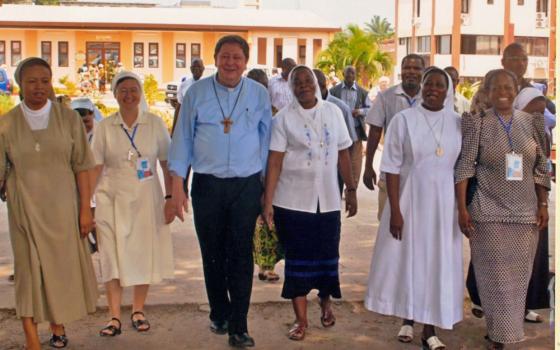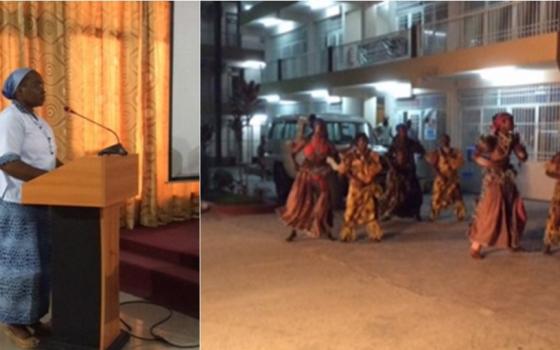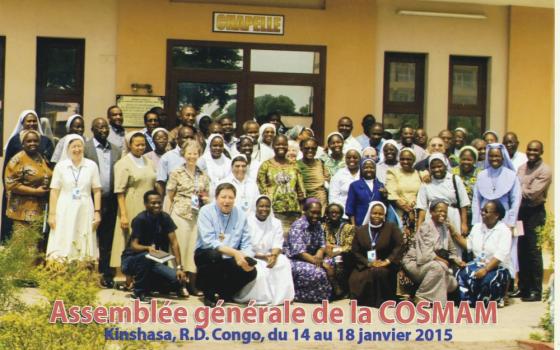I was so excited when Sr. Sidonie Oyembo, provincial of the Sisters of Mary Immaculate of Gabon, was elected the third president of the Confederation of Major Superiors of Africa and Madagascar (COMSAM). She never dreamed three years ago when she attended the second meeting of the organization in Kampala, Uganda, that she would become its leader. Her passionate acceptance speech at the final liturgy in Kinshasa, Democratic Republic of Congo was loudly cheered. She declared COMSAM’s potential to bring about reconciliation and communion within and among African countries, Madagascar and beyond. When I interviewed her when she was still vice president, her enthusiasm about COMSAM’s value was infectious. I hoped at that moment that she would be the new president.
What is so important about COMSAM? Clearly, the future of the church is in Africa, Madagascar and Asia. The growing numbers of Catholics and many vocations to religious life will carry out the mission of Christ in the world and determine the direction of the church. The bishops of Africa and Madagascar, recognizing this reality, invited religious in 1997 to organize a continental organization. It finally happened in 2005. COMSAM representatives from every African country and Madagascar meet every three years to reflect on issues common to religious life and to plan ways to address together cultural, religious and political issues in the five major regions of Africa and Madagascar.
Sister Sidone noted the presence of the many conflicts rampant on many levels of African and Madagascar societies. She spoke strongly about the importance of collaboration, not just among religious congregations of women and men but partnerships with laity, clergy, bishops and youth. Unity must be COMSAM’s first concern if the challenges that face the continent can be addressed. The witness of collaboration and communion is the prophecy needed in the world today . . . finding ways to embrace diversity and not be afraid of it.
Sidone was clearly committed to the COMSAM directions set by the assembly in Kampala, Uganda in 2012: to establish communication links and initiate collaboration where possible. She helped lead the Central African region in addressing Ebola. Religious leaders designed a plan to conscientize and educate their communities about how to prevent Ebola from taking root. Ebola never invaded Central Africa! These collaborative efforts bore more fruit later in 2014 when political and church conflicts between Kinshasa, DRC, and Brazzaville, Congo, arose. Regional COMSAM leaders kept united through communication and were able to maintain communion among themselves
The bishops of the Symposium of Episcopal Conferences of African and Madagascar (SECAM), were impressed by COMSAM’s efforts of collaboration. Thus, in 2014, as vice president of COMSAM, Sidone became the first woman to be invited by the Central African bishops to their annual meeting to give a woman’s view on family life. She carried on a consultation with women of the region to bring their voices with her. That same year, again, as the only woman, she participated in a SECAM project of Faith, Culture and Development in Tanzania. During the Year of Faith, SECAM sponsored a pilgrimage to Rome. Ordinarily only seminarians are invited to participate in these events, but this time sisters were included. Another unprecedented move.
Sidone told me that these experiences of successful relationship building and collaboration gave her hope and empowered her to take up the leadership of COMSAM for the next three years.
Over 50 religious superiors from 26 African countries attended the COMSAM conference in Kinshasa in January. Many women religious represented West and Central Africa, but only one from southern Africa, one from Madagascar, and only two sisters from the nine countries of East Africa. Sr. Patricia Murray, executive director of the International Union of Superiors General (UISG), and Fr. Richard, executive secretary of the Union of Superiors General (USG), were also invited. Their presence was greatly applauded because it affirmed the importance of religious life in Africa. However, the most significant visitor was Cardinal João Bráz de Aviz, prefect of the Congregation for Institutes of Consecrated Life and Societies of Apostolic Life. His warmth and humor as a person and obvious desire to assist religious of Africa and Madagascar was palpable. He spent two full days with the assembly.
I attended as a guest to invite these leaders to participate in the Global Sisters Report website. Most had not heard about it because of language. Africa is challenged by language divisions – French, Spanish, Portuguese and English – making the goal of communication difficult. Thankfully, all the presentations were translated simultaneously.
I was impressed by the four speakers’ presentations. Each spoke directly and clearly about the many positive developments of religious life on the continent and Madagascar. They also outlined some of the challenges facing its continued healthy development: the danger of losing the original inspiration and impetus of congregational charisms by not adapting them adequately to current realities; issues around power in congregations; divisions in local communities that stifle a sense of belonging; cultural beliefs and practices that destroy the Gospel-centered life of religious; loss of missionary zeal in favor of a comfortable life; lack of just relationships between bishops and religious regarding compensation and land; and the great need for African theological development and formation.
But, in the midst of these challenges and difficulties, the enthusiasm, determination and love of religious life was strongly present. These are women and men committed to strengthening their congregations and to working with others for the sake of the Gospel. Six members were elected as council to Sidone from Kenya, Mali, South Africa, Rwanda, Sierra Leone and Chad. They bravely took up the many challenges they will face. For one, travel in Africa is not simple or inexpensive. We can only hope that the electricity and Internet connections will work sufficiently so these leaders can meet through electronic methods across the continent. The budget of the organization is also very limited, even when each region pays their dues.
My only disappointment of the six days was the format of a lecture hall-style meeting. It did not allow for interaction among the participants. We missed out on the wisdom that each of these leaders could have shared with the group about their successes in meeting their many challenges. Granted, we did have country reports, but these were limited to 10 minutes each.
One evening we enjoyed Congo dancing and singing from a very professional troupe in Kinshasa. The color and sound was invigorating.
The planners chose the Democratic Republic of Congo as the venue for the meeting because it is the 50th anniversary of the national Conference of Religious. The number of women and men religious in the DRC are many, both international and local congregations. They have many resources to offer this vast and diverse country.
[Joyce Meyer, PBVM, is international liaison for Global Sisters Report.]



